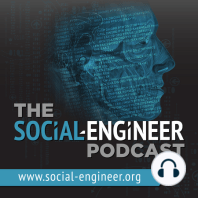55 min listen

Ep. 209 - The Doctor Is In Series - The TRUTH Behind Conspiracy Theories
Ep. 209 - The Doctor Is In Series - The TRUTH Behind Conspiracy Theories
ratings:
Length:
43 minutes
Released:
May 1, 2023
Format:
Podcast episode
Description
Welcome to the Social-Engineer Podcast: The Doctor Is In Series – where we will discuss understandings and developments in the field of psychology. In today’s episode, Chris and Abbie are discussing: Conspiracy theories. They will talk about what makes a Conspiracy Theory and why we believe them. [May 1, 2023] 00:00 - Intro 00:17 - Dr. Abbie Maroño Intro 00:59 - Intro Links - Social-Engineer.com - http://www.social-engineer.com/ - Managed Voice Phishing - https://www.social-engineer.com/services/vishing-service/ - Managed Email Phishing - https://www.social-engineer.com/services/se-phishing-service/ - Adversarial Simulations - https://www.social-engineer.com/services/social-engineering-penetration-test/ - Social-Engineer channel on SLACK - https://social-engineering-hq.slack.com/ssb - CLUTCH - http://www.pro-rock.com/ - innocentlivesfoundation.org - http://www.innocentlivesfoundation.org/ 04:45 - The Topic of the Day: The TRUTH Behind Conspiracy Theories 05:54 - What is a Conspiracy Theory? 07:39 - What's the harm? 10:20 - WHY??? 11:17 - Pattern Seekers 13:15 - Cognitive Closure 17:04 - The Role of Critical Thinking 19:18 - An Existential Element 20:41 - Don't Forget the Lizards! 22:35 - What about Bigfoot? 24:30 - Escapism 30:15 - Reading the Emotions 32:29 - Social Motive 33:31 - Emotions vs Critical Thinking 36:42 - Prove Me Wrong! 39:09 - The Takeaway: Empathy 40:57 - Wrap Up & Outro - www.social-engineer.com - www.innocentlivesfoundation.org Find us online: - Twitter: https://twitter.com/abbiejmarono - LinkedIn: linkedin.com/in/dr-abbie-maroño-phd-35ab2611a - Twitter: https://twitter.com/humanhacker - LinkedIn: linkedin.com/in/christopherhadnagy References: Abalakina-Paap, M., Stephan, W. G., Craig, T., & Gregory, L. (1999). Beliefs in conspiracies. Political Psychology, 20, 637–647. Adams, G., O’Brien, L. T., & Nelson, J. C. (2006). Perceptions of racism in Hurricane Katrina: A liberation psychology analysis. Analyses of Social Issues and Public Policy, 6, 215–235. Bilewicz, M., Winiewski, M., Kofta, M., & Wójcik, A. (2013). Harmful ideas: The structure and consequences of antiSemitic beliefs in Poland. Political Psychology, 34, 821–839. Bost, P. R., & Prunier, S. G. (2013). Rationality in conspiracy beliefs: The role of perceived motive. Psychological Reports, 113, 118–128 Crocker, J., Luhtanen, R., Broadnax, S., & Blaine, B. E. (1999). Belief in U.S. government conspiracies against Blacks among Black and White college students: Powerlessness or system blame? Personality and Social Psychology Bulletin, 25, 941–953. Dieguez, S., Wagner-Egger, P., & Gauvrit, N. (2015). Nothing happens by accident, or does it? A low prior for randomness does not explain belief in conspiracy theories. Psychological Science, 26, 1762–1770. Dieguez, S., Wagner-Egger, P., & Gauvrit, N. (2015). Nothing happens by accident, or does it? A low prior for randomness does not explain belief in conspiracy theories. Psychological Science, 26(11), 1762–1770. https://doi. org/10.1177/0956797615598740 DiFonzo, N., Bordia, P., & Rosnow, R. L. (1994). Reining in rumors. Organizational Dynamics, 23(1), 47–62. https://doi. org/10.1016/0090-2616(94)90087-6 Douglas, K. M., & Leite, A. C. (2017). Suspicion in the workplace: Organizational conspiracy theories and workrelated outcomes. British Journal of Psychology, 108, 486–506. Douglas, K. M., & Sutton, R. M. (2008). The hidden impact of conspiracy theories: Perceived and actual impact of theories surrounding the death of Princess Diana. Journal of Social Psychology, 148, 210–221. Douglas, K. M., Sutton, R. M., & Cichocka, A. (2017). The psychology of conspiracy theories. Current directions in psychological science, 26(6), 538-542. Douglas, K. M., Sutton, R. M., Callan, M. J., Dawtry, R. J., & Harv
Released:
May 1, 2023
Format:
Podcast episode
Titles in the series (100)
Ep. 098 - Winning the SECTF with Chris & Rachel: Chris Kirsch, the 1st place winner of the SECTF, is a returning competitor that came back to prove to himself how and why he CAN win this competition after his previous attempt was ...um... not so great. Rachel Tobac is our scariest competitor but... by The Social-Engineer Podcast